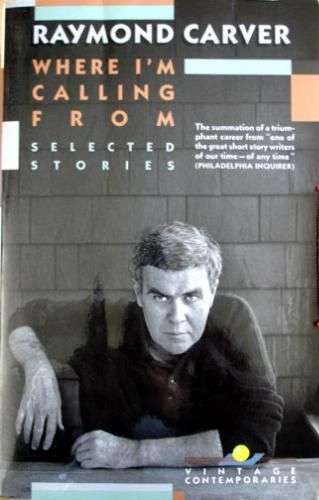
Where I'm Calling From: New and Selected Stories by Raymond Carver
Check my rate
| Main centres: | 1-3 business days |
| Regional areas: | 3-4 business days |
| Remote areas: | 3-5 business days |

| Main centres: | 1-3 business days |
| Regional areas: | 3-4 business days |
| Remote areas: | 3-5 business days |
Vintage Contemporaries Edition, 1989, softcover, 528 pages, condition: very good.
By the time of his early death in 1988, Raymond Carver had established himself as one of the greatest practitioners of the American short story, a writer who had not only found his own voice but imprinted it in the imaginations of thousands of readers.
'Where I'm Calling From', his last collection, encompasses classic stories from 'Cathedral', 'What We Talk About When We Talk About Love' and earlier Carver volumes, along with seven new works previosly unpublished in book form.
Together, these 37 stories give us a superb overview of Carver's life work and show us why he was so widely imitated but never equaled.
This book, which is an anthology of his short stories, is a holdover from college, a purchase required by a professor in my advanced fiction writing class. I cant remember reading beyond just a couple of the stories back in the late Nineties, but I did remember that my professor was trying to use Carver as an example of a writer who could fully develop very flawed characters, ones who felt more real than the tropes we were all definitely pulling fromor at least that I was pulling from because I remember having a terrible case of writers block that semester. A few years ago, I took a class on teaching fiction writing as part of my Masters program and decided to take this off the shelf in hopes that reading some of the stories of a well-regarded writer would inspire me to do well on the required stories for the class.
All in all, I wrote one story that I still think might be worth a revision and one that I completely scrapped once everything was done (and funny enough, the one that I think is worth it was inspired by a Hemingway short story, not one by Raymond Carver) and I put the book on my reading pile, determined to get through it at some point so I could check it off my to read list.
Carvers characters definitely are well-developed, although I have to say that he definitely calls upon the same types of people. So many of them are men who drink, smoke, are divorced, and might have varying degrees of success in life. I dont know how much of a reflection of Carver himself all of this is, but the stories certainly explore a type of masculinity that definitely has a darker side. I guess you could call it toxic, to be honest, and while in many cases Carver is showing us how messed up these people (and their situations) are, he also gives at least some of them compassion.